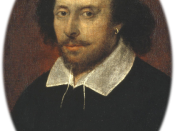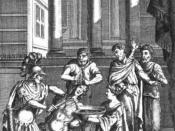1. The beginnings of a 'Motherless' world or
The crime against love as humanity
"When we are born, we cry that we are come
To this great stage of fools."
-- William Shakespeare, King Lear
"We wordly men
Have miserable, mad, mistaking eyes."
-- William Shakespeare, Titus Andronicus
The original mythology of the matriarchal society was that of the Goddess Earth in her three aspects: the white Goddess of birth and growth, the red Goddess of war and battle and the black Goddess of death and divination, praised and respected by men as her sons and lovers. She was "the personification of the power of Space, Time and Matter within whose bounds all arise and die", "the substance of body, configurator of life and thought, receiver of the dead for rebirth" . This was a mythology of unity, the Goddess was the Goddess of Complete Being, and man belonged to the cycles of nature as son and lover of the Goddess.
In the course of time, however, the mythology was transformed, reinterpreted and eventually suppressed. The Goddess was demonized and men turned into her masters. From the moment Antaeus, son of Gea, was 'weaned' remorselessly by Hercules, son of Zeus, the 'Cogito ergo sum' principle became the overpowering force in the world and the creative contact with Undine was severed for good.
What William Shakespeare tries to show us are tragic consequences of the myth of love substituted by the myth of power, domination and materialism. Such view of life reduced to a mere set of objects J.C. Ransom calls 'Platonism'. It is above all predatory for it translates the complexity of life to a set of manageable formulas, it is an impulse to devour and assimilate the richness of life out of fear that such complexity might...


